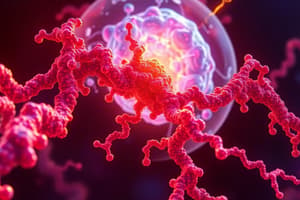Podcast
Questions and Answers
What is the main function of myosin II in muscle contraction?
What is the main function of myosin II in muscle contraction?
- To break down actin filaments
- To pull arrays of actin filaments together (correct)
- To synthesize ATP
- To transport vesicles over large distances
How do kinesin and myosin II move along protein filaments?
How do kinesin and myosin II move along protein filaments?
- Through a repulsive force
- Using a ladder-like mechanism
- By hydrolyzing ATP to change their shape (correct)
- By using a ratchet-like mechanism
What is the characteristic of muscle fibers?
What is the characteristic of muscle fibers?
- Multinucleate, long, and thin (correct)
- Multinucleate, short, and thin
- Uninucleate, long, and thick
- Uninucleate, short, and thin
What is the function of cross-bridges in muscle contraction?
What is the function of cross-bridges in muscle contraction?
What is the result of the sliding filament model of muscle contraction?
What is the result of the sliding filament model of muscle contraction?
In which direction do myosin II molecules move along actin filaments?
In which direction do myosin II molecules move along actin filaments?
What is the function of kinesin proteins?
What is the function of kinesin proteins?
How far can a single myosin II molecule move an actin filament?
How far can a single myosin II molecule move an actin filament?
What type of actin structures are exhibited by microvilli?
What type of actin structures are exhibited by microvilli?
Which protein links actin to membranes?
Which protein links actin to membranes?
What is the function of actin-membrane interactions?
What is the function of actin-membrane interactions?
What is a characteristic of intermediate filaments (IFs)?
What is a characteristic of intermediate filaments (IFs)?
What type of proteins are involved in forming actin networks?
What type of proteins are involved in forming actin networks?
What is the indirect connection between actin filaments and extracellular surfaces?
What is the indirect connection between actin filaments and extracellular surfaces?
What is the effect of cytochalasins on microfilaments?
What is the effect of cytochalasins on microfilaments?
What is the role of latrunculin A in microfilament formation?
What is the role of latrunculin A in microfilament formation?
What is the characteristic of actin in filopodia?
What is the characteristic of actin in filopodia?
What is the role of actin-binding proteins in regulating actin organization?
What is the role of actin-binding proteins in regulating actin organization?
What is the function of α-actinin in filopodia?
What is the function of α-actinin in filopodia?
What is the characteristic of the cell cortex?
What is the characteristic of the cell cortex?
What is the role of phalloidin in microfilament formation?
What is the role of phalloidin in microfilament formation?
Flashcards are hidden until you start studying
Study Notes
Type II Myosins
- Myosin II pulls arrays of actin filaments together, resulting in cell contraction
- Resembles kinesin, with globular domains that walk along a protein filament, using ATP hydrolysis to change shape
Kinesins Versus Myosin
- Kinesins transport vesicles over large distances, operating alone or in small numbers
- A single myosin II molecule slides an actin filament about 12–15 nm
- Myosin II molecules move short distances but operate in large arrays, mediating muscle contraction
Microfilament-Based Motility: Muscle Cells in Action
- Muscle contraction is the most familiar example of mechanical work mediated by intracellular filaments
- A muscle consists of parallel muscle fibers, each fiber being a long, thin, highly specialized, multinucleate cell
- Each muscle fiber contains numerous myofibrils, divided along their length into repeating units called sarcomeres
The Sliding-Filament Model Explains Muscle Contraction
- Myosin II moves toward the plus ends, so thick filaments move toward the Z lines during contraction (filaments remain same length)
- The sliding filament model explains muscle contraction, where thin filaments slide past thick filaments, with no change in length of either
- Cross-bridges form between F-actin of thin filaments and myosin heads of thick filaments, requiring lots of ATP to dissociate rapidly
Microfilament Organization and Dynamics
- Cytochalasins prevent the addition of new monomers to existing microfilaments
- Latrunculin A sequesters actin monomers and prevents their addition to microfilaments
- Phalloidin stabilizes microfilaments and prevents their depolymerization
- Actin-binding proteins regulate the organization of actin, controlling where actin assembles and the structure of resulting networks
Cells Can Dynamically Assemble Actin into a Variety of Structures
- The cell cortex has actin crosslinked into a gel of microfilaments
- Cells that adhere tightly to the underlying substratum have organized bundles called stress fibers
- Lamellipodia have a branched network of actin
- Filopodia have highly oriented, polarized cables with actin plus ends toward the tip of the protrusion
Actin-Binding Proteins Regulate Actin Organization
- Cells use actin-binding proteins to control where actin assembles and the structure of the resulting network
- Control occurs at the nucleation, elongation, and severing of microfilaments and at the association of microfilaments into networks
Proteins That Bundle Actin Filaments
- α-Actinin and fascin/fimbrin are proteins that bundle actin filaments
- Actin bundles in filopodia and microvilli are examples of ordered actin structures
Actin Networks and Membrane Interactions
- Actin filaments indirectly connect to the plasma membrane and exert force on it
- This connection requires one or more linking proteins, such as spectrin and ankyrin
- Actin–membrane interactions allow cells to respond to mechanical forces
Studying That Suits You
Use AI to generate personalized quizzes and flashcards to suit your learning preferences.




